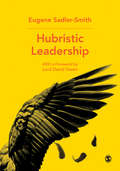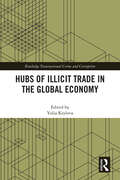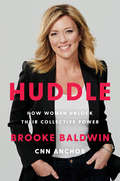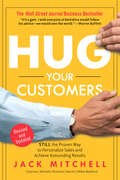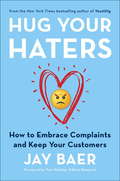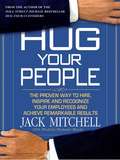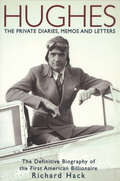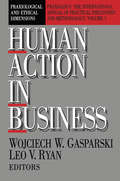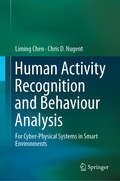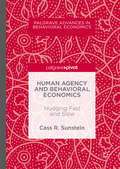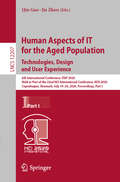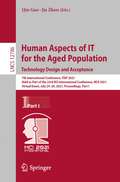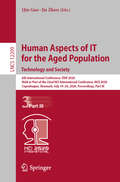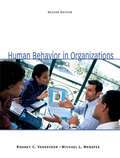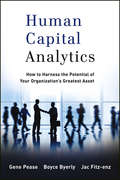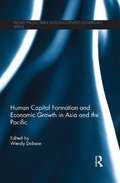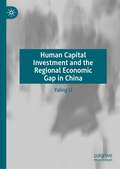- Table View
- List View
Hubristic Leadership
by Eugene Sadler-SmithInvestigating the societal, economic, financial and reputational costs of hubristic leadership, with insights into the characteristics and causes of this phenomenon, and recommended safeguards to avoid hubris from happening in the first place. As research into hubristic leadership becomes increasingly popular following recent political developments, the book adopts an inter-disciplinary approach to investigating this form of leadership. Outlining what causes hubristic leadership in the first place, the author looks at how it’s potentially destructive consequences can be anticipated and avoided through an informed stance of moderation, critical analysis and reflexivity. Examples are drawn from business and politics including the Lehmann Brothers, BP and Deepwater Horizon, Blair and Bush in the Iraq Invasion, NASA, and Donald Trump. Ideal reading for undergraduate and postgraduate students in business and management, leadership, and organizational behaviour. Check out the Hubris Hub for further information on hubristic leadership, including a regularly updated blog written by author Eugene Sadler-Smith.
Hubs of Illicit Trade in the Global Economy (Routledge Transnational Crime and Corruption)
by Yulia KrylovaThis book meticulously examines how centers of illicit trade pose myriad threats to global security and sustainable development. The exponential growth of illicit trade, resulting in annual losses amounting to trillions of dollars for the global economy, is increasingly concentrated within specific geographic areas. These locales serve as safe havens for smugglers and their accomplices, fostering a criminal ecosystem that facilitates the convergence of various criminal activities. The book underscores the detrimental impact of poorly regulated international free trade zones, which prioritize expediency over security, thereby allowing illicit trade to flourish in regions characterized by opaque governance and lax regulatory oversight. It comprehensively explores the spectrum of illicit trade present in notorious hubs such as the Argentina-Brazil-Paraguay Tri-Border Area, Dubai, Panama, Belize, Guatemala, and Ukraine. Emphasizing the phenomenon of crime convergence associated with these hubs, the book offers actionable recommendations for disrupting their interconnected illicit supply chains, infrastructures, and networks. By addressing this interconnectedness, the book fills a critical void in understanding how vulnerabilities within the global economy fuel the creation of illicit trade hubs. It will be of great value to researchers in the fields of trade, economics, criminology, and international development. It will also be an excellent resource for government agencies, policymakers, and private-sector managers in those industries most affected by the growing problem of illicit trade.
Huddle: How Women Unlock Their Collective Power
by Brooke BaldwinCNN news anchor Brooke Baldwin explores the phenomenon of “huddling,” when women lean on one another—in politics, Hollywood, activism, the arts, sports, and everyday friendships—to provide each other support, empowerment, inspiration, and the strength to solve problems or enact meaningful change. Whether they are facing adversity (like workplace inequity or a global pandemic) or organizing to make the world a better place, women are a highly potent resource for one another. Through a mix of journalism and personal narrative, Baldwin takes readers beyond the big headline-making huddles from recent years (such as the Women’s March, #MeToo, Times Up, and the record number of women running for public office) and embeds herself in groups of women of all ages, races, religions and socio-economic backgrounds who are banding together in America. HUDDLE explores several stories including:The benefits of all-girls learning environments, such as Karlie Kloss’s Kode with Klossy and Reese Witherspoon’s Filmmaker Lab for Girls in which young women are given the freedom to make mistakes, and find their confidence.The tactics employed by huddles of women who work in male-dominated industries including a group of US veterans/Democratic Congresswomen, a huddle of African-American judges in Harris County, Texas, and an all-female writers room in Hollywood.The wisdom of huddling from trusted pioneers such as Gloria Steinem, Billie Jean King, and Madeleine Albright as well as contemporary trailblazers like Stacey Abrams and Ava DuVernay. How professionals such as Chef Dominique Crenn and sports agent Lindsay Colas use their success to amplify other women in their fields. The ways huddles of women are dedicated to making seismic change, including a look at Indigenous women saving the planet, the women who founded Black Lives Matter, the mothers fighting for sensible gun laws, America’s favorite female athletes (Megan Rapinoe, Hilary Knight, and Sue Bird to name a few) agitating for equal pay, and female teachers rallying to improve their working conditions.The bond between women who practice self-care and trauma healing together, including the women who courageously survived sexual abuse, and the women who heal together in The Class and GirlTrek.The ways women are becoming more intentional about the life-saving power of friendship, including the bonds between military wives, new moms, and nurses getting through the time of Covid.Throughout her examination of this fascinating huddle phenomenon, Baldwin learns about the periods of huddle ‘droughts” in America, as well as the ways that Black women have been huddling for centuries. She also uncovers how huddling can be the “secret sauce” that makes many things possible for women: success in the workplace, effective grassroots change, confidence in girlhood, and a better physical and mental health profile in adulthood. Along the way, Baldwin takes readers through her own personal journey of growing up in the South and climbing the ladder of a male-dominated industry. Like so many women in her field, she encountered many sharp elbows on her career path, but became an early believer in adding more seats to the table and huddling with other women for strength and solidarity. In the process of writing HUDDLE, Baldwin learns that this seemingly new phenomenon is actually something women have been doing for generations—a quiet, collective power she learns to unlock in her transformation from journalist to champion for women.
Hudepohl Brewing Co.
by S. Keys Malcolm S. Salter B. Applegate M. Blicksilver J. Elrod E. Y. SnowdenPresents the problem of how an established regional brewer can survive the onslaught of national breweries, some of which are being cross-subsidized by diversified parent companies. Requires detailed analysis of what operations are profitable and unprofitable for Hudepohl, in addition to industry and competitive analysis. Hudepohl is a private company.
Hudson Manufacturing Co.
by Paul A. Gompers Vanesa Del Valle BroussardConcerns the decision by Brett Keith and Owen Colligan to purchase Hudson Manufacturing, a maker of heaters and air filtration units for the military. Keith and Colligan have organized a search fund and identified Hudson as a potential buyout. The decline in the trucking market and potential environmental contamination, however, stand to stop the deal.
Hudson Manufacturing Co.
by Paul A. Gompers Vanesa Del Valle BroussardConcerns the decision by Brett Keith and Owen Colligan to purchase Hudson Manufacturing, a maker of heaters and air filtration units for the military. Keith and Colligan have organized a search fund and identified Hudson as a potential buyout. The decline in the trucking market and potential environmental contamination, however, stand to stop the deal.
Hudson Yards - The Other Side of the Tracks?
by John D. Macomber A. Eugene Kohn Christopher M Gordon Lisa StropeStephan Ross, CEO or Related Companies, is considering an opportunity to invest $1 billion for the air rights over the Hudson Rail Yards in New York City. The investment would allow Related to build a platform over the operating rail tracks and develop this blighted edge of New York City into one of the top tier places to live, work and shop in the world.
Hug Your Customers: STILL The Proven Way to Personalize Sales and Achieve Astounding Results
by Jack MitchellA master of customer service reveals his secrets for developing long-lasting business relationships and customer loyalty."We shower our customers with attention. There's no doubt in my mind that our philosophy can be applied to selling just about anything--from aircraft engines to beanbags." (Jack Mitchell) The only way to stay in business is with customers, and Jack Mitchell knows how to attract them, and how to keep them.He has a deceptively simple but winning relationship approach to customer service--that a relationship is at the heart of every transaction. Jack's business philosophy is based on "hugs"--personal touches that impress and satisfy the customer, such as: Remembering the name of your customer's dog Calling a customer to make sure he's satisfied after a purchase Having a "kids' corner" with TV, books, and treats Knowing your customers golf handicap Introducing customers to business contacts Letting your customer use your office to make a personal phone callThis is a proven theory--hugging works! Mitchells/Richards achieves among the highest margins in its industry, as well as amazing customer loyalty. Complete with anecdotes that exemplify outstanding customer service, Hug Your Customers shows how any business can adapt this hugging philosophy to attract great staff, lower marketing costs, and maintain higher gross margins and long-term revenues. At a time when customer service has become the difference between success and failure, Hug Your Customers shows how Jack's one-of-a-kind philosophy brings the results you're looking for.
Hug Your Haters: How to Embrace Complaints and Keep Your Customers
by Jay BaerHaters are not your problem. . . . Ignoring them is. Eighty percent of companies say they deliver outstanding customer service, but only 8 percent of their customers agree. This book will help you close that gap by reconfiguring your customer service to deliver knockout experiences. The near-universal adoption of smartphones and social media has fundamentally altered the science of complaints. Critics ("haters") can now express their displeasure faster and more publicly than ever. These trends have resulted in an overall increase in complaints and a belief by many businesses that they have to "pick their spots" when choosing to answer criticisms. Bestselling author Jay Baer shows why that approach is a major mistake. Based on an extensive proprietary study of how, where, and why we complain, Hug Your Haters proves that there are two types of complainers, each with very different motivations: ·Offstage haters. These people simply want solutions to their problems. They complain via legacy channels where the likelihood of a response is highest--phone, e-mail, and company websites. Offstage haters don't care if anyone else finds out, as long as they get answers. ·Onstage haters. These people are often disappointed by a substandard interaction via traditional channels, so they turn to indirect venues, such as social media, online review sites, and discussion boards. Onstage haters want more than solutions--they want an audience to share their righteous indignation. Hug Your Haters shows exactly how to deal with both groups, drawing on meticulously researched case studies from businesses of all types and sizes from around the world. It includes specific playbooks and formulas as well as a fold-out poster of "the Hatrix," which summarizes the best strategies for different situations. The book is also filled with poignant and hilarious examples of haters gone wild, and companies gone crazy, as well as inspirational stories of companies responding with speed, compassion, and humanity. Whether you work for a mom-and-pop store or a global brand, you will have haters--and you can't afford to ignore them. Baer's insights and tactics will teach you how to embrace complaints, put haters to work for you, and turn bad news into good outcomes.From the Hardcover edition.
Hug Your People: The Proven Way to Hire, Inspire, and Recognize Your Employees and Achieve Remarkable Results
by Jack MitchellToday, when social networking is the hottest buzz word and 'relationships' are things that can happen virtually, top CEO and inspirational speaker Jack Mitchell is totally committed to bringing back the human connection in our businesses and our lives. Now in Hug Your People, Jack shares his 5-step plan for creating a winning team: * Be NICE - because how you treat one another is as important as how you treat your customers; * Learn to TRUST - it's a crucial part of building strong working relationships; * Instill PRIDE in your team and the work they do; give them all the 'tools' they need to do their jobs well; * Try to INCLUDE your team in decision-making processes; you can't do it alone, so reach out for their input; * Generously RECOGNIZE the contributions made and celebrate victories, big and small, because they all count. Simple, unpretentious and fun, Hug Your People is a morale-boosting blueprint for success. With its blend of anecdotes and practical advice it will inspire you to build an energized, focused team - the type of team that is at the heart of every great organization.
Hughes: The Private Diaries, Memos and Letters
by Richard HackHoward Hughes (1905-1976) was a true American original: legendary lover, record-setting aviator, idiosyncratic film producer, talented inventor, ultimate eccentric—and, for much of his lifetime, the richest man in the United States. His desire for privacy was so fierce and his isolation so complete that even several decades after his death, inaccurate stories continue to circulate about him. Richard Hack explodes the illusion of Hughes' life and exposes the man behind the myth--a playboy whose sexual exploits with Hollywood stars were legendary, an entrepreneur without ethics, an explorer without maps, and ultimately, an eccentric trapped by his own insanity. Drawing on secreted letters, declassified FBI files, autopsy reports, more than 110,000 pages of court testimony, and exclusive interviews, Hack reveals a man so devious in his thinking and so perverse in his desires that his impact continues to be felt even today. From entertainment to politics, aviation to espionage, the influence and manipulation of Howard Hughes has left an indelible and unique mark on the American cultural landscape.
Hulu: An Evil Plot to Destroy the World?
by Anita Elberse Sunil GuptaIn July 2009, Jason Kilar, the chief executive officer of Hulu, is debating whether the online video aggregator should move away from a purely advertising-supported model, and whether it should participate in an industry-wide initiative to develop and test "authentication" technology that can facilitate a subscription or pay-per-view model. The case traces the early years of Hulu, a joint venture between News Corp. and NBC Universal, that was initially met with strong skepticism but quickly became on the most celebrated and popular online video business. Provides in-depth information on how the company serves content owners, users, and advertisers. Describes the online video space in considerable detail, also covering economic and viewership statistics that enable a rich discussion of viable business models.
Hulu: Redefining the Way People Experience TV
by Christine Snively Henry McGeeIn May 2017, Hulu CEO Mike Hopkins announced the launch of Hulu Live TV, a new offering that would "change the way people experience TV." The new service would allow consumers to bypass traditional cable and satellite delivery and use the Internet to access live streams of more than 40 popular broadcast and cable networks along with Hulu’s existing suite of on-demand programming. Priced at $39.99 per month, Hulu Live TV offered consumers a tremendous savings over traditional cable program packages and allowed subscribers to watch programs on Internet-connected televisions and a wide range of mobile devices. Hopkins also announced that the company would make a major push into the production of exclusive, original programming, one of the industry's most competitive areas. Hulu's new initiatives occurred during a major transformation in the TV industry as the Internet had revolutionized every aspect of the business. Industry observers wondered if Hulu could successfully compete against the entrenched cable, satellite, and telephone companies (known as Multichannel Video Programming Distributors, or MVPDs). Was $39.99 per month a sustainable price point for Hulu's new virtual MVPD (vMVPD)? How big a war chest would the company need to succeed in the original programming arena where competitors annually spent billions of dollars? Could Hulu navigate potential conflicts with the individual business plans of its owners: Comcast, 21st Century Fox, Disney, and Warner Bros.—some of the most powerful companies in the entertainment business?
Human Action in Business: Praxiological and Ethical Dimensions
by Wojciech W. Gasparski Leo V. RyanPraxiology deals with working and doing from the point of view of effectiveness. It has three components: analysis of concepts involving purposive actions; critique of modes of action from the viewpoint of efficiency; and normative advisory aspects in recommendations for increasing human efficiency. This fifth volume of the Praxiology series is devoted to Human Action in Business: Praxiological and Ethical Dimensions. The adjective praxiological here means not only related to praxiology as human theory, but also assessed against the dimensions of effectiveness and efficiency. Adding also the ethical dimension, one defines the universe of the discourse about conduct characteristic of business, the economy, and management.Topics in business and management philosophy and theory are discussed by eminent contributors from different corners of the world: P. Ulrich (Switzerland); M. Bohata (Czech Republic); S. K. Chakreborty (India); J. Donaldson, H.E. Sternberg, and P. Graham (U.K.); H. van Lujik and H. Hummels (The Netherlands); O. Loukola (Finland); Y. Pesqueux and I. Tovey (France); T.A. Mathias (India); W. W. Gasparski, A. Lewicka-Strzalecka and J. Sojka (Poland); M. Tamari (Israel); R. E. Freeman, R. G. Kennedy, S. Natale, J. A. Matel, N. Bowie, D. McCann, L. V. Ryan, P. Werhane, and K. Goodpaster (United States). Selected speeches by Pope John Paul II addressed to managers, businessmen, and general audiences involved in the economy are also included in this volume.In Volume 5, invited specialists examine the praxiological and ethical aspects of human action under the rubric of the "Triple E": Efficiency, Effectiveness, and Ethics. The volume opens with contributions reflecting on the praxiological and ethical foundations for business followed by sections discussing human action from the perspectives of religious beliefs and cultural diversity. Another section illustrates the application of these principles to business. The concluding chapters examine praxiology and ethics as the moral agenda for professional education. The volume is a must read for economists, businesspeople, social scientists, and policymakers.
Human Activity Recognition and Behaviour Analysis: For Cyber-Physical Systems in Smart Environments
by Chris D. Nugent Liming ChenThe book first defines the problems, various concepts and notions related to activity recognition, and introduces the fundamental rationale and state-of-the-art methodologies and approaches. It then describes the use of artificial intelligence techniques and advanced knowledge technologies for the modelling and lifecycle analysis of human activities and behaviours based on real-time sensing observations from sensor networks and the Internet of Things. It also covers inference and decision-support methods and mechanisms, as well as personalization and adaptation techniques, which are required for emerging smart human-machine pervasive systems, such as self-management and assistive technologies in smart healthcare. Each chapter includes theoretical background, technological underpinnings and practical implementation, and step-by-step information on how to address and solve specific problems in topical areas.This monograph can be used as a textbook for postgraduate and PhD students on courses such as computer systems, pervasive computing, data analytics and digital health. It is also a valuable research reference resource for postdoctoral candidates and academics in relevant research and application domains, such as data analytics, smart cities, smart energy, and smart healthcare, to name but a few. Moreover, it offers smart technology and application developers practical insights into the use of activity recognition and behaviour analysis in state-of-the-art cyber-physical systems. Lastly, it provides healthcare solution developers and providers with information about the opportunities and possible innovative solutions for personalized healthcare and stratified medicine.
Human Agency and Behavioral Economics
by Cass R. SunsteinThis Palgrave Pivot offers comprehensive evidence about what people actually think of "nudge" policies designed to steer decision makers' choices in positive directions. The data reveal that people in diverse nations generally favor nudges by strong majorities, with a preference for educative efforts - such as calorie labels - that equip individuals to make the best decisions for their own lives. On the other hand, there are significant arguments for noneducational nudges - such as automatic enrollment in savings plans - as they allow people to devote their scarce time and attention to their most pressing concerns. The decision to use either educative or noneducative nudges raises fundamental questions about human freedom in both theory and practice. Sunstein's findings and analysis offer lessons for those involved in law and policy who are choosing which method to support as the most effective way to encourage lifestyle changes.
Human Aspects of IT for the Aged Population. Technologies, Design and User Experience: 6th International Conference, ITAP 2020, Held as Part of the 22nd HCI International Conference, HCII 2020, Copenhagen, Denmark, July 19–24, 2020, Proceedings, Part I (Lecture Notes in Computer Science #12207)
by Jia Zhou Qin GaoThis three volume set of LNCS 12207, 12208 and 12209 constitutes the refereed proceedings of the 6th International Conference on Human Aspects of IT for the Aged Population, ITAP 2020, held as part of the 22nd International Conference, HCI International 2020, which took place in Copenhagen, Denmark, in July 2020. The conference was held virtually due to the COVID-19 pandemic. The total of 1439 papers and 238 posters have been accepted for publication in the HCII 2020 proceedings from a total of 6326 submissions. ITAP 2020 includes a total of 104 regular papers which are organized in topical sections named: Involving Older Adults in HCI Methodology , User Experience and Aging, Aging and Mobile and Wearable Devices, Health and Rehabilitation Technologies, Well-being, Persuasion, Health Education and Cognitive Support, Aging in Place, Cultural and Entertainment Experiences for Older Adults, Aging and Social Media, Technology Acceptance and Societal Impact.
Human Aspects of IT for the Aged Population. Technology Design and Acceptance: 7th International Conference, ITAP 2021, Held as Part of the 23rd HCI International Conference, HCII 2021, Virtual Event, July 24–29, 2021, Proceedings, Part I (Lecture Notes in Computer Science #12786)
by Jia Zhou Qin GaoThis two-volume set constitutes the proceedings of the 7th International Conference on Human Aspects of IT for the Aged Population, ITAP 2021, held as part of the 23rd International Conference, HCI International 2021, held as a virtual event, in July 2021. The total of 1276 papers and 241 posters included in the 36 HCII 2021 proceedings volumes was carefully reviewed and selected from 5222 submissions. ITAP 2021 includes a total of 67 regular papers; they focus on topics related to designing for and with older users, technology acceptance and user experience of older users, use of social media and games by the aging population, as well as applications supporting health, wellbeing, communication, social participation and everyday activities.
Human Aspects of IT for the Aged Population. Technology and Society: 6th International Conference, ITAP 2020, Held as Part of the 22nd HCI International Conference, HCII 2020, Copenhagen, Denmark, July 19–24, 2020, Proceedings, Part III (Lecture Notes in Computer Science #12209)
by Jia Zhou Qin GaoThis three volume set of LNCS 12207, 12208 and 12209 constitutes the refereed proceedings of the 6th International Conference on Human Aspects of IT for the Aged Population, ITAP 2020, held as part of the 22nd International Conference, HCI International 2020, which took place in Copenhagen, Denmark, in July 2020. The conference was held virtually due to the COVID-19 pandemic. The total of 1439 papers and 238 posters have been accepted for publication in the HCII 2020 proceedings from a total of 6326 submissions. ITAP 2020 includes a total of 104 regular papers which are organized in topical sections named: Involving Older Adults in HCI Methodology , User Experience and Aging, Aging and Mobile and Wearable Devices, Health and Rehabilitation Technologies, Well-being, Persuasion, Health Education and Cognitive Support, Aging in Place, Cultural and Entertainment Experiences for Older Adults, Aging and Social Media, Technology Acceptance and Societal Impact.
Human Awareness, Energy and Environmental Attitudes
by Boris Aberšek Andrej FlogieThis book raises awareness about environmental issues that result from energy production, extraction and conversion, and examines the attitudes people have about these issues. It discusses societal and educational relations associated with energy and environmental issues, focusing on philosophical, sociological and psychological views, and provides an analysis of how the individual and the society perceive, process and analyze the information on this subject. The authors present the concept of environmentally conscious engineering, discussing various forms of energy extraction and production, and detail alternative, under-researched and unaffordable solutions, such as nuclear fusion and artificial photosynthesis. The book also touches on topics such as the storage of energy and greenhouse gases, recycling and reuse of energy waste, and energy saving and efficiency. The book will be of interest to students and researchers of environmentally conscious engineering, energy use, and human dimensions of ecology and the environment, as well as NGOs, policy makers, and environmental activists.
Human Barrier Design and Lifecycle: A Cognitive Ergonomics Approach and Path Forward
by Tom ShephardA common source of failure in a human‑dependent barrier or safety critical task is a designed‑in mismatch error. The mismatch is a cognitive demand that exceeds the human capability to reliably and promptly respond to that demand given the plausible situations at that moment. Demand situations often include incomplete information, increased time pressures, and challenging environments. This book presents innovative solutions to reveal, prevent, and mitigate these and many other cognitive‑type errors in barriers and safety critical tasks. The comprehensive model and methodologies also provide insight into where and to what extent these barriers and task types may be significantly underspecified and the potential consequences.This title presents a new and comprehensive prototype design and lifecycle model specific to human‑dependent barriers and safety critical tasks. Designed to supplement current practice, the model is fully underpinned by cognitive ergonomics and cognitive science. The book also presents a compelling case for why a new global consensus standard specific to human‑dependent barriers is needed. Taking a novel approach, it presents its suggested basis, framing, and content. Both solutions seek to redress deficiencies in global regulations, standards, and practice. The model is guided by industry recommendations and best practice guidance and solutions from globally recognized experts. Its processes are fully explained and supported by examples, analysis, and well‑researched background materials. Real‑life case studies from offshore oil and gas, chemical manufacturing, transmission pipelines, and product storage provide further insight into how overt and latent design errors contributed to barrier degradation and failure and the consequence of those errors.An essential and fascinating read for professionals, Human Barrier Design and Lifecycle: A Cognitive Ergonomics Approach and Path Forward will appeal to those in the fields of human factors, process and technical safety, functional safety, display and safety system design, risk management, facility engineering, and facility operations and maintenance.Chapters 1 and 8 of this book are freely available as downloadable Open Access PDFs at http://www.taylorfrancis.com under a Creative Commons Attribution-Non Commercial-No Derivatives (CC-BYNC-ND) 4.0 International license.
Human Behavior in Organizations (Second Edition)
by Rodney C. Vandeveer Michael L. MenefeeThe goal of this book is to provide students with the basics of Human Behaviour in Organizations in a way that will help them envision how they will fit into organizations and be successful in their leadership roles.
Human Capital Analytics
by Jac Fitz-Enz Boyce Byerly Gene PeaseAn insightful look at the implementation of advanced analytics on human capitalHuman capital analytics, also known as human resources analytics or talent analytics, is the application of sophisticated data mining and business analytics techniques to human resources data. Human Capital Analytics provides an in-depth look at the science of human capital analytics, giving practical examples from case studies of companies applying analytics to their people decisions and providing a framework for using predictive analytics to optimize human capital investments. Written by Gene Pease, Boyce Byerly, and Jac Fitz-enz, widely regarded as the father of human capitalOffers practical examples from case studies of companies applying analytics to their people decisionsAn in-depth discussion of tools needed to do the work, particularly focusing on multivariate analysisThe challenge of human resources analytics is to identify what data should be captured and how to use the data to model and predict capabilities so the organization gets an optimal return on investment on its human capital. The goal of human capital analytics is to provide an organization with insights for effectively managing employees so that business goals can be reached quickly and efficiently. Written by human capital analytics specialists Gene Pease, Boyce Byerly, and Jac Fitz-enz, Human Capital Analytics provides essential action steps for implementation of advanced analytics on human capital.
Human Capital Formation and Economic Growth in Asia and the Pacific (PAFTAD (Pacific Trade and Development Conference Series))
by Wendy DobsonThe entire planet looks to Asian and other emerging markets to sustain growth momentum as traditional markets in the USA and Europe struggle with the slow and arduous processes of deleveraging after the global financial crisis. At the same time, there is growing recognition in Asia that the sources of growth must shift to sustain their own growth momentum in the years ahead. Heavy reliance on the region’s high savings rates and plentiful supplies of low-cost labour will have to shift towards increasing the human capital embodied in more educated and skilled labour forces capable of contributing to productivity growth and innovation as future drivers of growth. Human Capital Formation and Economic Growth in Asia and the Pacific focuses on why and how countries are making this shift. The demographic transition is shown to be a significant factor as ageing populations in Japan, South Korea and China manage declining growth in the labour force by stepping up investments in education, and by changing policies and institutions. Lessons to be learned from these experiences by more youthful populations in Southeast Asia are explored. In addition, attention is paid to the consequences of cross-border differentials in technical knowledge and the quantity and quality of human capital. Several implications for public policy and for international cooperation on human-capital issues in the Asian region are identified. The chapters in this volume are edited versions of papers presented at the 35th Pacific Trade and Development conference held in Vancouver, Canada, in June 2012. The conference goal was to better understand how governments and business in Asia and the Pacific can apply the key insight that one of the reasons economies grow is because of human-capital formation – the quality and diversity of the labour force are augmented – not just because the labour force grows in size. Students of Asia’s growth prospects will find several aspects of this volume of particular value. It includes chapters on the big-picture conceptual and measurement issues; on country experiences in meeting the imperatives of the demographic transition and investing in education and skills training; and on country experiences with attracting foreign knowledge and the supply and recruitment of skills across borders in Asia and the Pacific. Policymakers will also find useful the discussions of policy implications and the menu of issues requiring intergovernmental cooperation within the Asian region.
Human Capital Investment and the Regional Economic Gap in China
by Yaling LiAccording to the neoclassical growth theory and the endogenous growth theory, changes in the stock of capital and labor affect economic growth rates in the short run, and differences in human capital stocks are likely to affect total factor productivity directly and long-term economic growth rates indirectly. Therefore, human capital is a factor in the secular trends of regional economic gaps. In this study, the author examines the relationship between regional economic disparities and the country’s human capital stocks and structure in China between 1990 and 2015, a period of economic transformation in the country. Available empirical evidence supports the argument that boosting investment toward and optimizing the spatial distribution of human capital can help mitigate regional economic disparity and facilitate balanced and coordinated economic development across the country.
